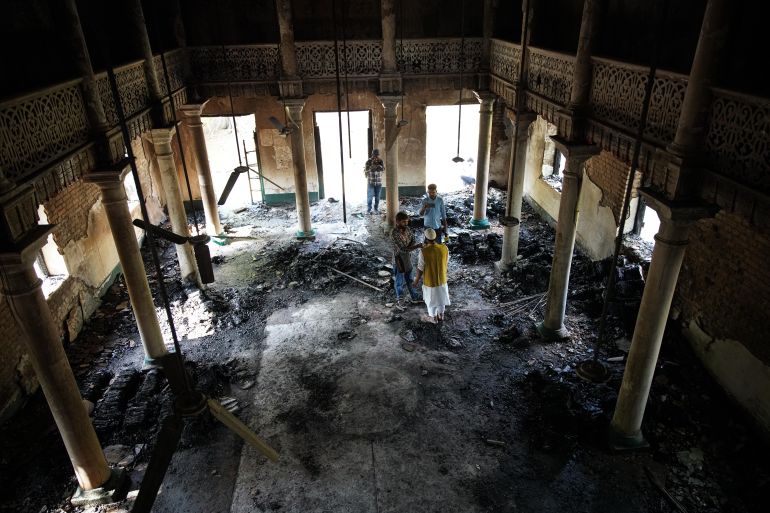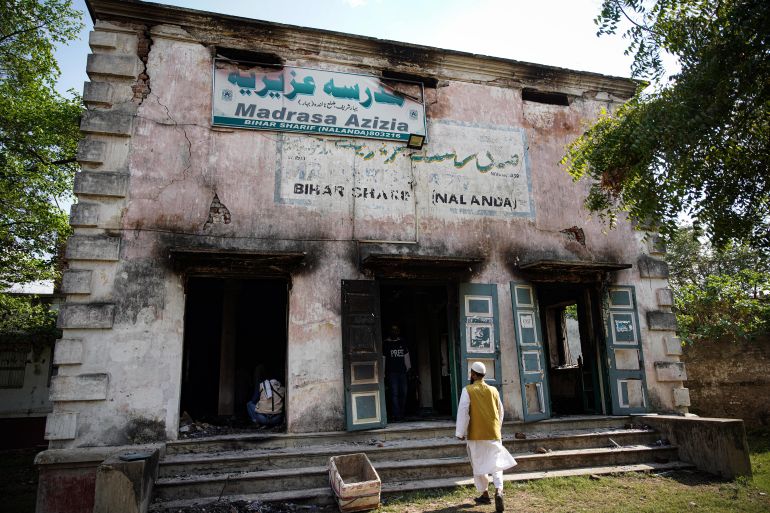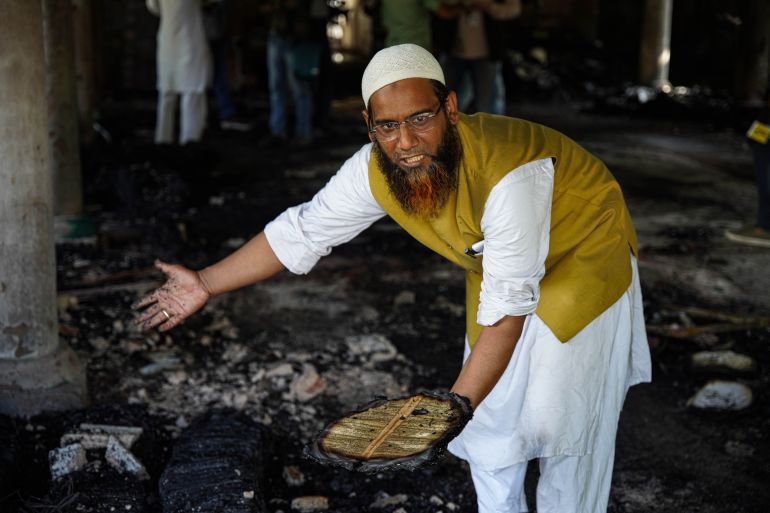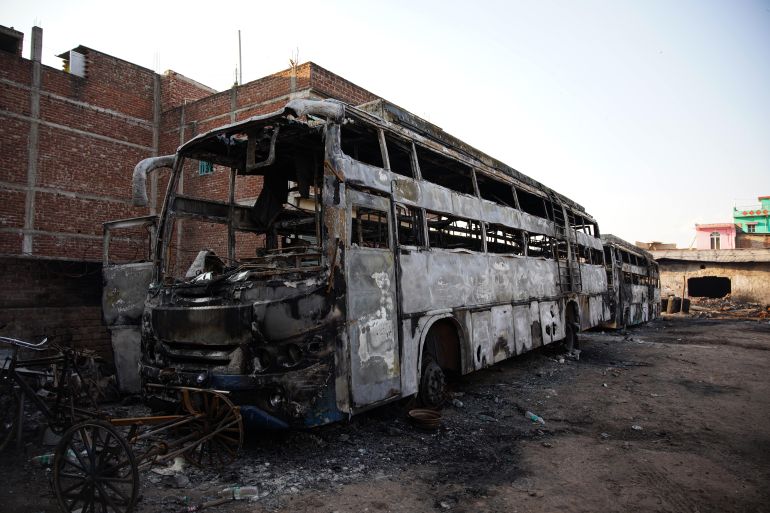India town mourns burning of historic library at Muslim school
Residents of Bihar Sharif town are still coming to terms with attack on a century-old ‘madrassa’ during the Hindu festival of Ram Navami.

Bihar Sharif, India – Glass shards, stones, bricks and liquor bottles are spread all across the compound. The door at the entrance of the main building is missing. The wreckage of burned fans, windows, doors and furniture is lying on the floor, blackened with soot. In one corner, water is dripping from the broken ceiling.
This was the scene when Al Jazeera earlier this month visited Madrassa Azizia, a prominent Muslim school in Bihar Sharif town of Nalanda district in eastern India’s Bihar state.
Recommended Stories
list of 4 items- list 1 of 4One dead as violence rocks eastern India during Hindu festival
- list 2 of 4Spike in anti-Muslim rallies since BJP retook India’s Maharashtra
- list 3 of 4OIC says Muslims targeted on Hindu festival, India rejects charge
- list 4 of 4Politics of ruin: Why Modi wants to demolish India’s mosques
The school in the town’s Murarpur neighbourhood, established over a century ago, was attacked by a mob on March 31 during Ram Navami, a Hindu festival that, according to rights groups, saw a large number of processions pass through mainly Muslim neighbourhoods across India, with people carrying weapons, chanting provocative slogans and even attacking shops, homes and religious structures.

Residents said a mob of about 1,000 men – armed with sticks and petrol bombs – barged into the school and set it on fire, destroying its library that housed nearly 5,000 books, including precious manuscripts and historical documents.
Mohan Bahadur, the school’s security guard, told Al Jazeera the mob was shouting “Jai Shri Ram” (Hail Lord Ram), a religious slogan that has become a rallying cry for Hindu right-wing groups against its minorities, mainly Muslims and Christians.
Bahadur said when he saw the procession advance towards the school, he tried to lock its gates. “But the crowd pelted stones and broke the gate,” he said.
“A man from the crowd pushed and slapped me, and yelled at me, ‘You Nepali bastard, we will kill you,’” Bahadur said, adding that he got scared and ran away from the site.

Mohammad Shakir Qasmi, the principal of the school, told Al Jazeera he was at his home to break his Ramadan fast when the violence erupted.
“When I got a call from the security guard, I rushed out and reached the main road where I saw some boys were pelting stones and a marriage hall was on fire,” he said.
Qasmi said when he visited the school the next morning, he was shocked by what he saw.
“They [rioters] had tried to destroy everything. I cried when I saw that thousands of books had turned to ash. I can’t believe they did this and I had never thought this could ever happen here,” he told Al Jazeera.
Among the books the school’s library had were copies of the Quran, books on Hadith, and handwritten Islamic books dating to more than 100 years. “All those books are now gone,” said Qasmi.
When Al Jazeera visited the school on April 2, the signs of violence were still fresh.
Mohammad Shahabuddin, the imam of a nearby mosque that was also attacked, was sifting through piles of ash, collecting half-burned pages of the Quran and other books, and stacking them aside.
“We were preparing for iftar when the mob barged in. We had to run away for our safety. They broke the gate, knocked down the minarets of the mosque and set fire to the vehicles that were parked in the yard of the mosque,” he said.

The imam said he locked himself in a room inside the mosque for hours before he was rescued by the police.
Qasmi and Shahabuddin alleged the police were absent from the streets when the violence broke out and arrived hours later despite the closest police station at Laheri being barely 500 metres (1,640 feet) away from the school.
Ashok Mishra, a senior police officer in Nalanda, said police have arrested 130 people, while raids were on for more arrests after identifying culprits using the security camera footage.
“Efforts are being made to normalise the situation by conducting peace marches,” Mishra told Al Jazeera.

Naushad Alam, a senior official in Bihar’s capital Patna who visited the violence-hit areas in Nalanda, told Al Jazeera the state government was taking steps to ensure peace and harmony in the area.
Meanwhile, the burning of the school and its historic library has sparked outrage among the state’s Muslims.
“All the books were precious and unique,” Umar Ashraf, a 27-year-old history blogger, told Al Jazeera.
“Even the furniture at the library was unique. There were rare books on philosophy, logic and traditional medicine. The attack seems to be a deliberate act of erasing our precious literature.”
Ashraf said the school was established around 1900 by Bibi Soghra, a prominent Muslim philanthropist who dedicated her property to the education of people and other community works.
He said more than 500 children were enrolled in one of Bihar’s oldest schools where apart from Islamic education in Quran, jurisprudence and Hadith, the students also studied English, maths, sciences and humanities.

In a statement last week, rights group Human Rights Watch said India’s ruling Bharatiya Janata Party (BJP) was using Hindu festivals “to rally voters, leading to an increase in violence”.
“These mobs are emboldened by a sense of political patronage that affords them impunity,” said Meenakshi Ganguly, the group’s South Asia director.
Bihar, however, is currently ruled by a coalition opposed to the BJP.
On Saturday, state’s Chief Minister Nitish Kumar said his government was working to compensate for the losses suffered by the people during the riots in Bihar Sharif.
“The administration is doing its job. Wherever there has been any damage [due to violence] we are looking into that. We will do whatever is required to be done for the people,” he told the reporters.
